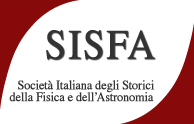Conveners
History and epistemology of physics: Part 1
- Danilo CAPECCHI (Sapienza Università di Roma (retired))
History and epistemology of physics: Part 2
- There are no conveners in this block
History and epistemology of physics: Part 3
- Adele Naddeo (INFN, Sezione di Napoli)
The aim of this contribution is to show a transition in the notion of interaction among bodies from early Newtonian to Post-Newtonian theory of (no-relativistic) mechanics. In Newton’s early mechanics, the two notions of impenetrable body or solid and interaction by shock or contact had the role of elementary concepts. The interaction at a distance had the value of phenomenological model,...
In the first edition of his celebrated book, The Principles of Quantum Mechanics Paul Dirac rejected the axiomatic method as inadequate to the new theory; he implicitly applied, although in an approximative way, a new model of theoretical organization which was later discovered through a comparison of some past mathematical and physical theories . However, being unable to formalize this new...
The development of physics shows its highly theoretical character through the participation of unobservable entities in opposition to the physicalist conception. In this sense, the problem of the unobservables becomes a core issue, opening fierce debates in the philosophy of science. Despite the positions and ideologies, men of science construct unobservable entities from certain indicative...
Although the Italian presence in the history of Venezuela can be traced back at its very beginning, with figures like Cristoforo Colombo (1451-1506), who discovered the country in 1498, followed by Amerigo Vespucci (1454-1512), who in 1499 provided its name as “Little Venice” when he saw the Indian palafittes on the Guajira Peninsula, the arrival of Italians in Venezuela became particularly...
The basic assumption of modern science is that the world has its own rationality and that man can understand it with some means made available by his mind. The origin of this idea must be sought in Greek Philosophy and the Stoics (especially the First Stoa) had a notable influence in defining it. In fact, they believed that the universe is the work of a reason, a logos, and from this they...
$\phantom{-}$ From Earth Sciences come clues on a role of the aether in the evolution of Earth, planets, and universe. Paleogeographic reconstructions allow a rough evaluation of the new ordinary matter added to the planet in the unity of time, and some inferences on the inner energy balance of the Earth. The need of central flow of aether is considered here. Its origins can be found in Isaac...

